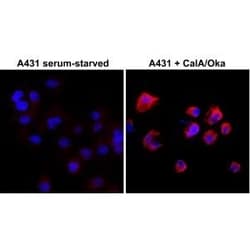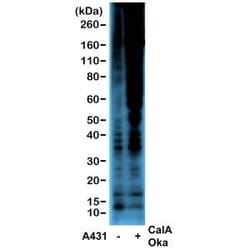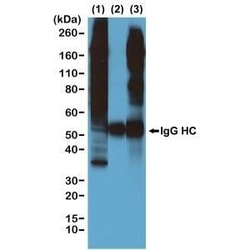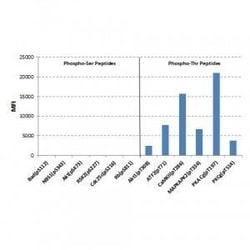Learn More
Invitrogen™ Phosphothreonine Recombinant Rabbit Monoclonal Antibody (RM102)
Rabbit Recombinant Monoclonal Antibody
Supplier: Invitrogen™ MA527976
Description
Recombinant rabbit monoclonal antibodies are produced using in vitro expression systems. The expression systems are developed by cloning in the specific antibody DNA sequences from immunoreactive rabbits. Then, individual clones are screened to select the best candidates for production. The advantages of using recombinant rabbit monoclonal antibodies include: better specificity and sensitivity, lot-to-lot consistency, animal origin-free formulations, and broader immunoreactivity to diverse targets due to larger rabbit immune repertoire.
Phosphothreonine is a phosphoamino acid, the phosphorylated ester of threonine. There are three amino acids that are typically phosphorylated in eukaryotes: serine, threonine, and tyrosine. Threonine residues in endogenous proteins undergo phosphorylation through the action of a threonine kinase. Small amounts of free phosphothreonine can be detected in urine Antibodies against phosphothreonine can be used as an identifier in the analysis of peptides, proteins, and enzymes. [National Center for Biotechnology Information.
Specifications
| Phosphothreonine | |
| Recombinant Monoclonal | |
| 1.0 mg/mL | |
| PBS with 1% BSA, 50% glycerol and 0.09% sodium azide | |
| Rabbit | |
| Protein A | |
| RUO | |
| Chemical | |
| Antibody | |
| IgG |
| ChIP Assay, Immunohistochemistry, Immunoprecipitation, Western Blot, Luminex, Immunocytochemistry | |
| RM102 | |
| Unconjugated | |
| C4H10NO6P; O-phospho-L-threonine; Phospho-threonine; pThr; Threonine | |
| Mixture of phosphothreonine-BSA conjugate and a phosphothreonine containing peptide. | |
| 100 μg | |
| Primary | |
| -20°C | |
| Liquid | |
| Chemical |
Your input is important to us. Please complete this form to provide feedback related to the content on this product.



